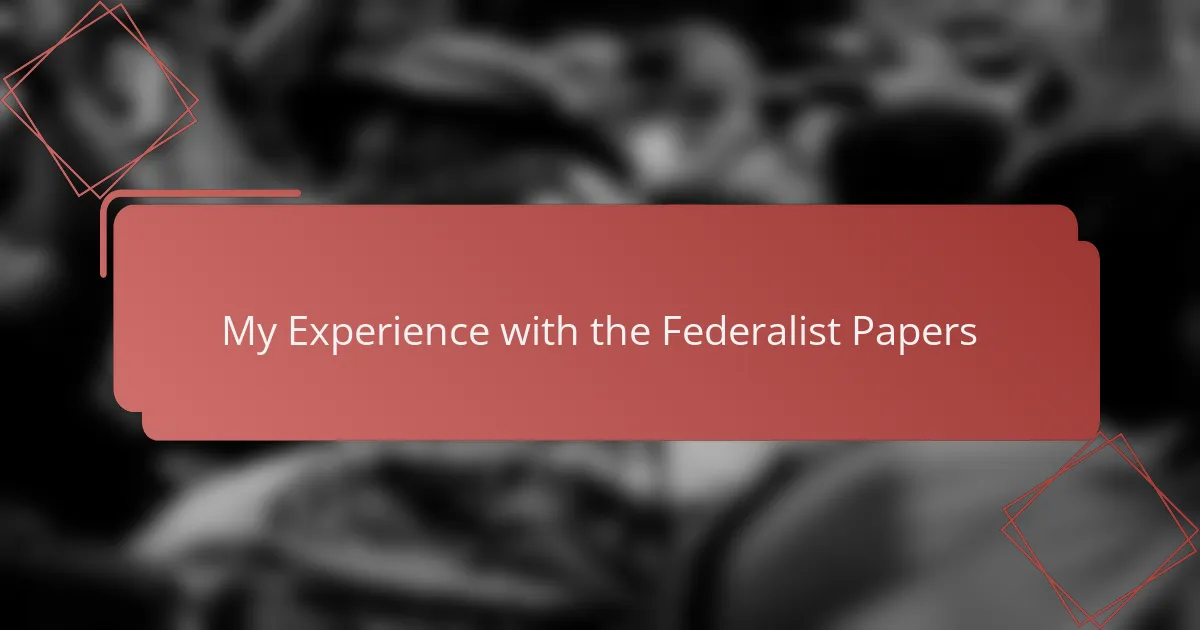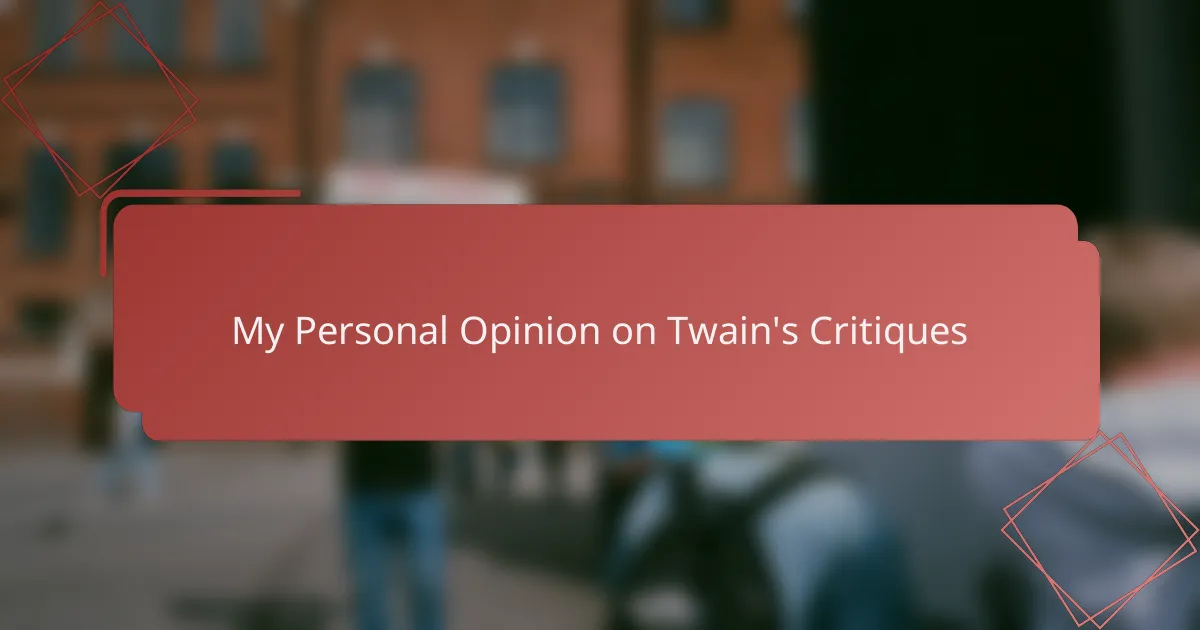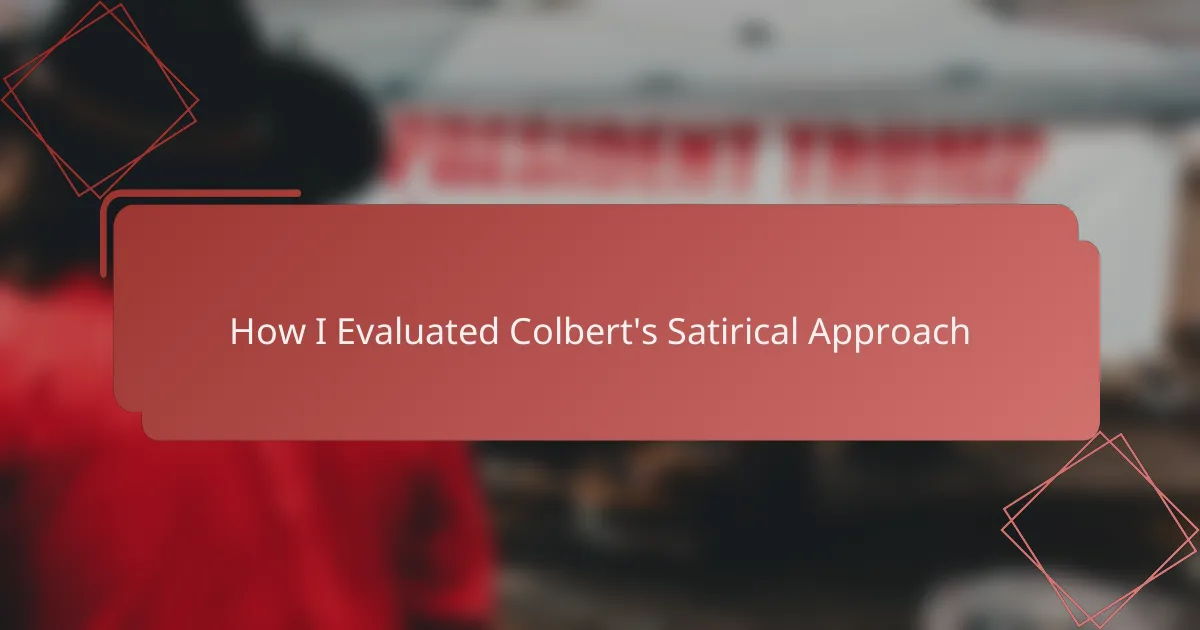Key takeaways
- Political satire utilizes humor and irony to critique political flaws and societal issues, encouraging critical thinking.
- Aristophanes’ works, set in a turbulent historical context, fearlessly addressed serious political matters, blending entertainment with significant commentary.
- Key techniques in satire such as exaggeration, parody, and irony amplify political messages, making complex ideas accessible.
- Studying Aristophanes emphasizes the power of satire as a transformative tool for social critique that remains relevant today.

Understanding Political Satire Basics
Political satire, at its core, uses humor and irony to expose and criticize political flaws and societal issues. When I first approached Aristophanes’ work, I realized that understanding these basics was crucial to appreciating how deeply his plays pierced through the politics of his time with wit and sharpness. It wasn’t just about laughter; it was about revealing uncomfortable truths.
Grasping the essence of political satire helped me see Aristophanes not just as a playwright but as a keen observer of power dynamics. Here’s what I focused on to build that foundation:
- Satire’s role in challenging authority and highlighting corruption
- The use of exaggeration and irony to make political points more impactful
- How humor can disarm audiences and encourage critical thinking
- The historical and cultural context shaping the satire’s targets
- The balance between entertainment and delivering a serious political message
This approach made the complex world of Aristophanes feel surprisingly accessible and relevant even today.
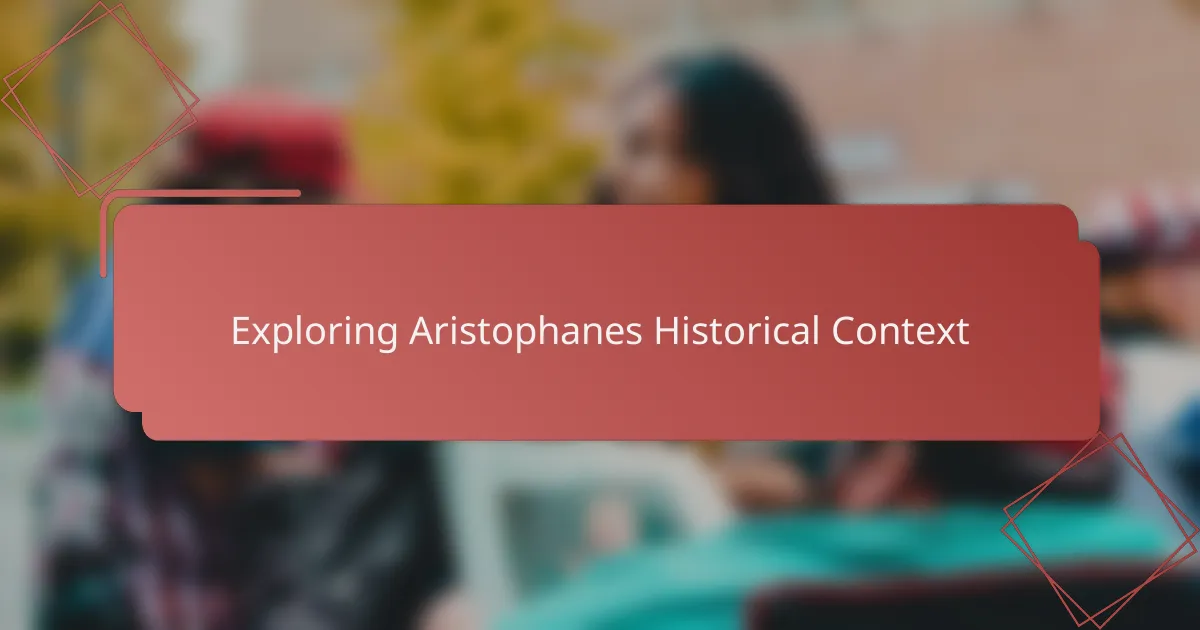
Exploring Aristophanes Historical Context
Exploring Aristophanes Historical Context
Aristophanes lived during ancient Athens’ classical period, a time marked by political turmoil and the Peloponnesian War. Understanding this backdrop helped me see why his plays brim with sharp political satire—they weren’t just jokes but courageous critiques of powerful leaders and societal issues. When I first read his work, knowing the high stakes of his era made me appreciate his boldness more deeply.
| Aspect | Details |
|---|---|
| Time Period | Classical Athens (5th century BCE) |
| Political Climate | Peloponnesian War and democratic tensions |
| Themes | Political corruption, war critique, societal follies |
| Impact on Audience | Provoked thought and controversy among Athenians |
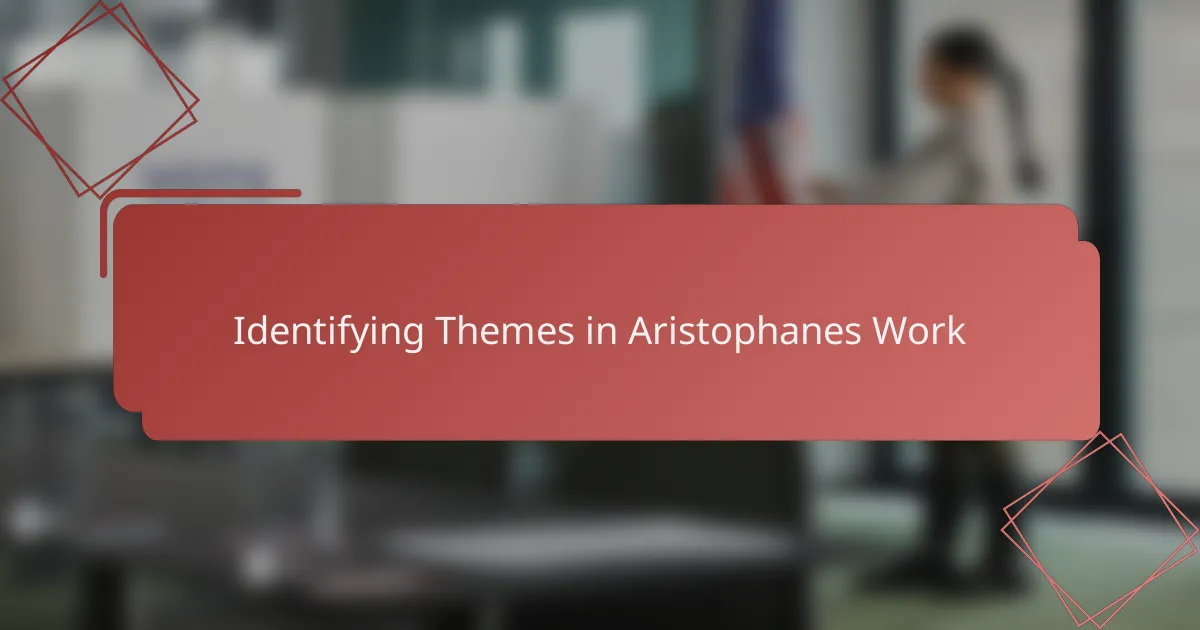
Identifying Themes in Aristophanes Work
When I first dove into Aristophanes’ plays, I was struck by his fearless use of humor to tackle serious political issues. Identifying themes in his work wasn’t just about noting recurring ideas, but feeling how cleverly he exposed the absurdities of Athenian society. It was like peeling back layers of laughter to find sharp commentary underneath.
What stood out to me most was how Aristophanes wove themes of war, leadership, and social folly throughout his comedies. His satire didn’t just entertain; it sparked reflection on power and justice—topics still relevant today. Here are some of the key themes I discovered:
- Critique of War and Militarism: Highlighting the futility and destruction caused by conflict
- Political Corruption and Hypocrisy: Exposing dishonest leaders and their failures
- Social Conservative vs. Progressive Tensions: Debating tradition versus change in society
- Role of Women and Gender Dynamics: Using comedy to comment on gender roles
- The Power of Language and Rhetoric: Showing how speech can manipulate or reveal truth

Analyzing Satirical Techniques Used
Analyzing Aristophanes’ satirical techniques was eye-opening for me. His use of exaggeration and parody really stood out, making complex political ideas both accessible and humorous. I found myself laughing even as I recognized the sharp critique hidden beneath the comedy.
| Satirical Technique | Aristophanes’ Use |
|---|---|
| Exaggeration | Amplifies political flaws to absurd levels, highlighting their ridiculousness. |
| Parody | Mimics public figures and societal norms with a comedic twist to expose hypocrisy. |
| Irony | Contrasts characters’ words and actions to reveal underlying political corruption. |
| Chorus | Functions as a collective commentator, bridging between actors and audience with satire. |
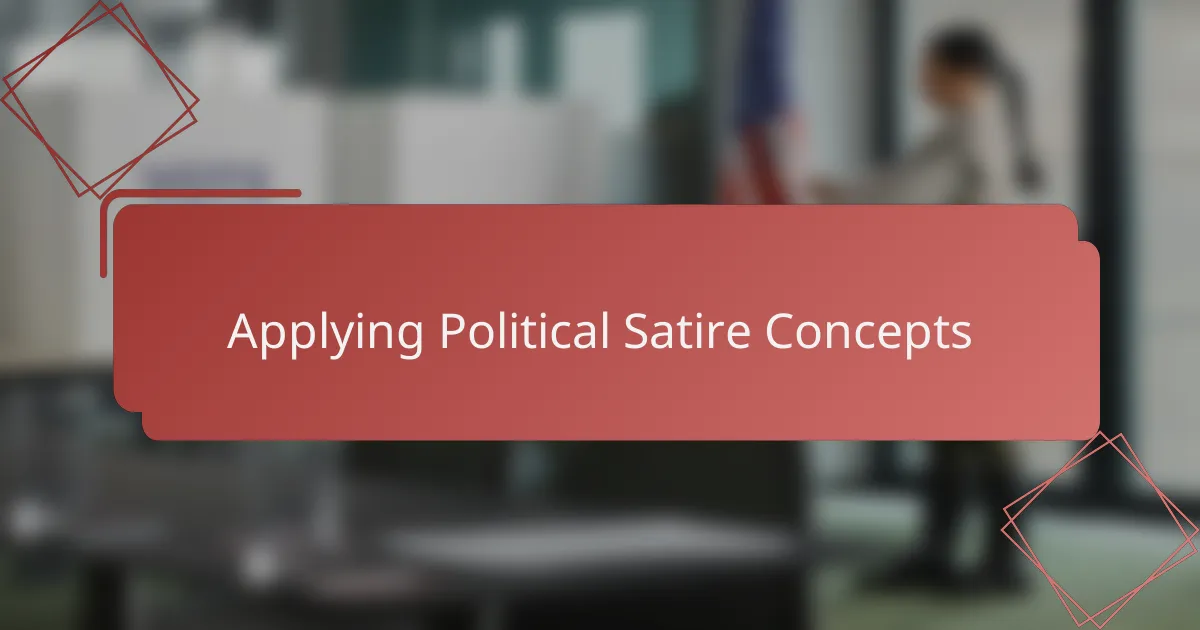
Applying Political Satire Concepts
Applying political satire concepts to Aristophanes’ work revealed to me the timelessness of humor as a tool for critique. I found that his plays cleverly combine sharp wit with bold political commentary, inspiring me to look beyond just laughs and focus on the underlying messages. This approach really transformed how I analyze satire today—always searching for the deeper social or political critique beneath the humor.
| Element | Aristophanes’ Political Satire |
|---|---|
| Target of Satire | Prominent political leaders and Athenian democracy |
| Style | Exaggeration, parody, and direct confrontation |
| Effect on Audience | Provokes thought through humor and outrage |
| Modern Application | Use satire for social critique while engaging audiences emotionally |

Reflecting on Personal Study Methods
When I first approached Aristophanes’ work, I found that simply reading the plays wasn’t enough to grasp the sharpness of his political satire. I made it a point to annotate key passages, noting how humor intertwined with criticism; this technique revealed layers of meaning I might have otherwise missed. It felt rewarding to connect his ancient jabs with modern political scenarios, which sparked a deeper appreciation for his craft.
To dive deeper, I used focused group discussions to challenge my interpretations, discovering fresh perspectives that enriched my understanding. Sharing my thoughts and hearing others’ insights created an engaging dynamic that helped me see Aristophanes’ satire as a living dialogue rather than static text. Here’s how I approached the study:
- Annotated texts with personal reflections and historical context
- Cross-referenced modern political events to identify timeless satire elements
- Participated in discussion groups to explore diverse viewpoints
- Took notes on recurring themes like power and hypocrisy
- Compared translations to catch nuances in language and tone
- Created diagrams mapping characters to contemporary political figures
- Recorded vocal readings to feel the rhythm and comedic timing
- Wrote short essays to synthesize insights and solidify learning
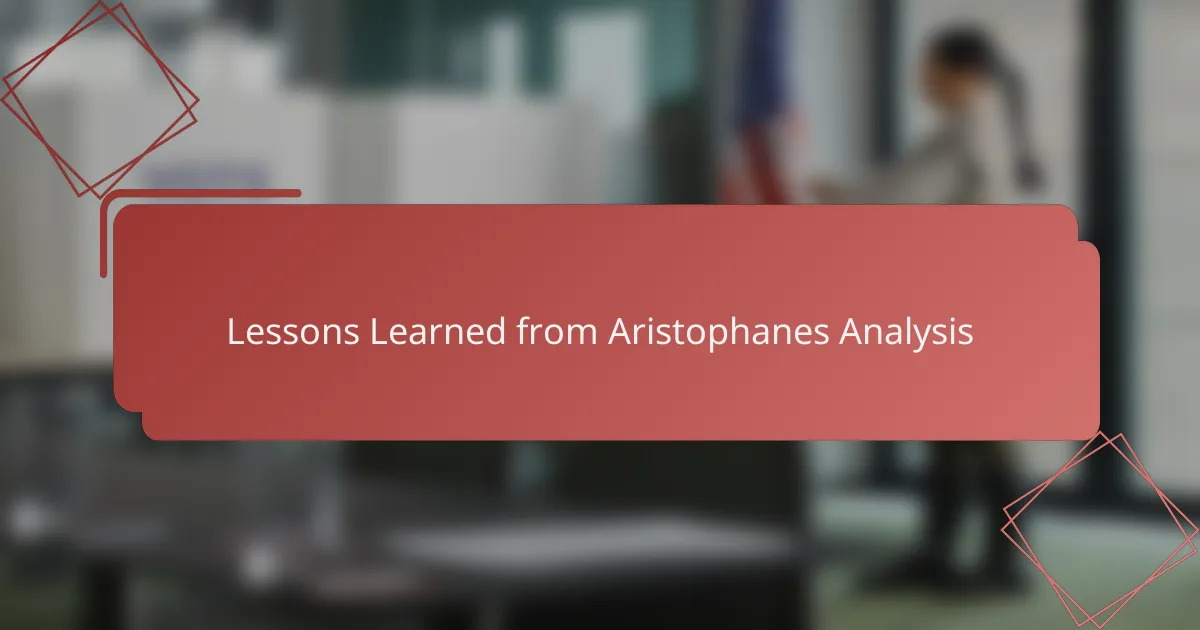
Lessons Learned from Aristophanes Analysis
Studying Aristophanes’ work taught me how powerful satire can be when it targets political and social flaws with wit and boldness. I was struck by his fearless approach—he didn’t shy away from offending the powerful, and that inspired me to appreciate satire as not just comedy, but as a crucial form of political commentary.
What really stayed with me was how Aristophanes layered humor with sharp critique, making complex issues accessible and engaging. This balance between entertainment and seriousness made me realize the importance of tone when analyzing political satire in any context.
- Satire must be bold to challenge authority effectively.
- Humor can simplify complex political ideas for broader audiences.
- Layering wit with serious critique increases satirical impact.
- Fearlessness in criticism strengthens the message’s authenticity.
- Political satire serves as a mirror reflecting societal flaws.

